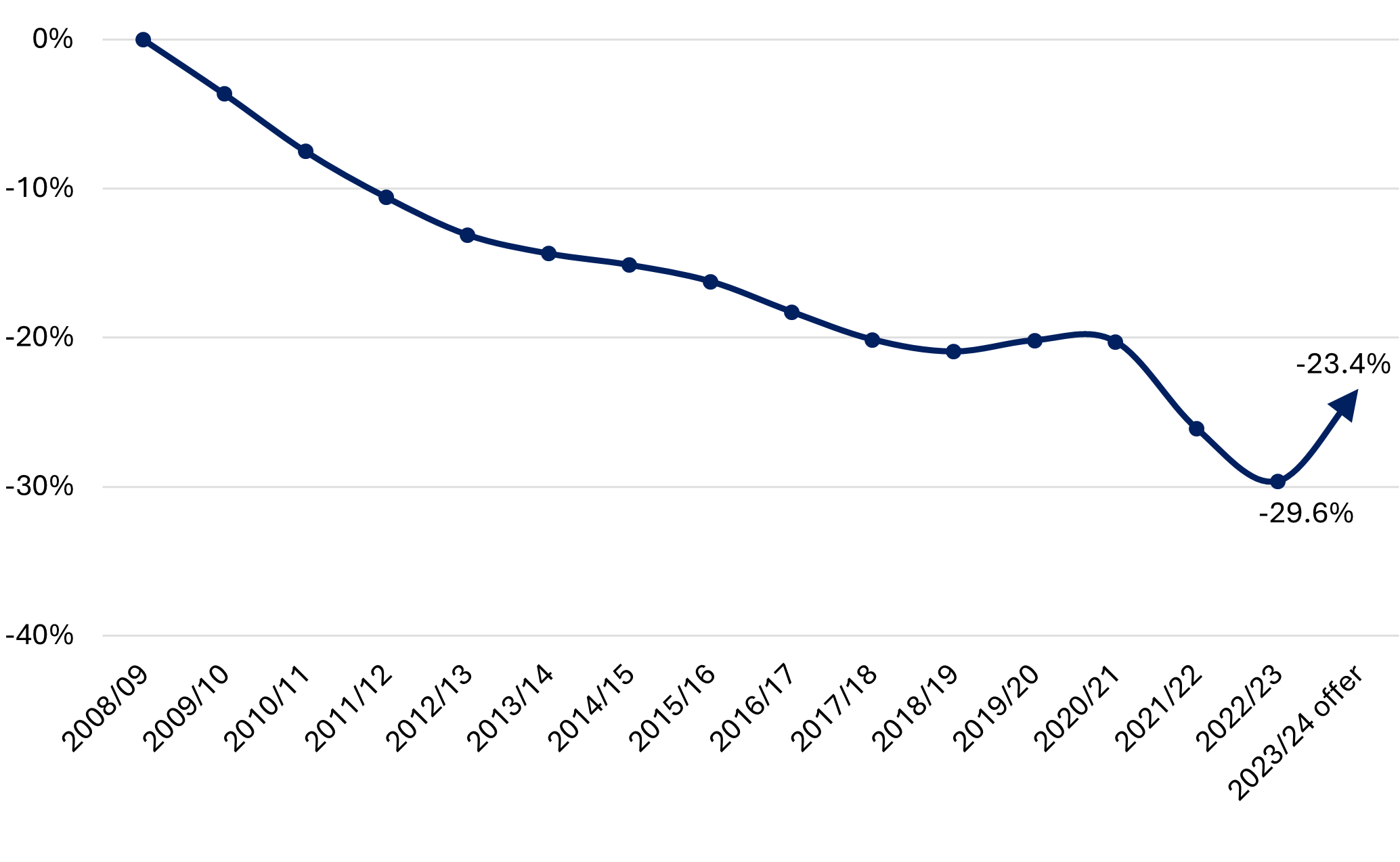Since the acceptance of the pay award outlined below for the 2023/24 pay year, the Welsh Government has announced its pay award for the 2024/25 pay year, full details can be found in the pay circular here
Pay uplifts
The offer contains an extra 7.4% uplift for all resident doctor pay points, bringing the in-year total to 12.4% for 2023/24. This is backdated to 1 April 2023, meaning that significant amounts of backpay will be paid.
| Scale | Pay point | Current value (inc. 5%) | Proposed value (full 12.4%) | 12 months of backpay |
|---|---|---|---|---|
| FY1 | Min | £28,471.00 | £30,477.26 | £2,006.51 |
| FY1 | 1 | £30,249.00 | £32,380.19 | £2,131.79 |
| FY1 | 2 | £32,028.00 | £34,284.25 | £2,257.15 |
| FY2 | Min | £35,315.00 | £37,803.49 | £2,488.84 |
| FY2 | 1 | £37,625.00 | £40,276.29 | £2,651.64 |
| FY2 | 2 | £39,933.00 | £42,746.84 | £2,814.29 |
| Specialty registrar | Min | £37,737.00 | £40,396.56 | £2,659.56 |
| Specialty registrar | 1 | £40,044.00 | £42,865.99 | £2,822.14 |
| Specialty registrar | 2 | £43,270.00 | £46,318.92 | £3,049.47 |
| Specialty registrar | 3 | £45,222.00 | £48,408.43 | £3,187.03 |
| Specialty registrar | 4 | £47,571.00 | £50,922.82 | £3,352.57 |
| Specialty registrar | 5 | £49,925.00 | £53,442.83 | £3,518.48 |
| Specialty registrar | 6 | £52,277.00 | £55,926.87 | £3,682.02 |
| Specialty registrar | 7 | £54,630.00 | £58,479.47 | £3,850.07 |
| Specialty registrar | 8 | £56,981.00 | £60,996.11 | £4,015.76 |
| Specialty registrar | 9 | £59,336.00 | £63,517.24 | £4,181.74 |
This means that resident doctors will be earning as much as £95,276 (SpR pay point 9 with a 50% banding). All resident doctors will be owed thousands of pounds of backpay, more than paying back the deductions we have experienced due to strike action. As the offer will be paid in the late summer or early autumn if approved at referendum, there will be more than 12 months owed, increasing this further beyond the figures above. Back pay will include banding supplements, so will likely be higher again than the figures above.
What does this mean for pay restoration?
This offer is a significant step towards full pay restoration. Taking into account projected inflation and pay compounding, this pay offer achieves a quarter of pay restoration in one year and is 9.1% above RPI inflation for April 2024 (3.3%).

Study budget
The Welsh Government has agreed to work with us to agree changes to the current study budget and study leave system in Wales. We will examine the barriers to accessing educational/development time including study leave and budgets, the amount of budget allocated to each trainee, how to make improvements to systems and processes, and develop a new system that will enhance access to and transparency of study budgets.
Fatigue and Facilities Charter reforms
The Welsh Government has recognised that large parts of the NHS Wales Fatigue and Facilities Charter remain unimplemented in health boards and trusts and that implementation is key to improving working conditions. The Welsh Government and NHS Wales Employers will therefore recommit to the provisions outlined in the charter and will work with us to proactively monitor implementation plans and timelines within health boards and trusts.
Assessments will be undertaken to establish current progress towards implementation and to understand the barriers/gaps in achieving full implementation. Once this assessment has been completed a costed achievable plan to achieve full implementation will be developed.
Why are we recommending this deal?
We think this offer is a credible pay rise that provides real progress towards pay restoration. All resident doctors in Wales will benefit immediately, with significant levels of backpay and higher consolidated pay moving forwards. We have secured commitments towards better study budgets and improved working conditions and have made clear that any future contract reform must deal with the issues identified with the previous proposals.
With possibly only weeks left until the DDRB recommendations for the pay rise for 2024/25 is announced, now is the right time to bank a good deal for 2023/24 and move forward with our ambitions for pay restoration. If future pay awards are not sufficient, we have proven that we can take action and win – and we won’t hesitate to do so again.
The negotiations with Welsh Government were challenging and we truly believe that this is the best offer that can be achieved by negotiation. Our collective strength ensured we got a deal this good and we think that it is the right thing to do to accept this now and move forward in our journey towards pay restoration.
DDRB reforms
The BMA has longstanding concerns about the effectiveness and independence of the DDRB, the pay review body responsible for reviewing doctors’ pay and recommending annual uplifts. In addition to the reforms secured by our colleagues in the UK consultants committee, we have secured the following reforms to the DDRB process in Wales. These reforms ensure the actions of the Welsh Government keep pace with the wider reforms to the DDRB terms of reference enacted by UK Government.
- Support for all changes to the pay review process agreed as part of the England Consultants pay deal in April 2024.
- To ensure that any remit letter is neutral and solely to start the process and indicate that Wales wants pay recommendations without reference to affordability.
- To agree that recommendations of the DDRB are only rejected rarely and due to a compelling reason.
- To ensure that Welsh Government participate in the review process in a timely manner in accordance with the timelines set out by the DDRB.
- To promptly implement the recommendations of the DDRB upon publication.
Other elements of the deal
- We have agreed to re-enter contract negotiations with the Welsh Government later this year with the ambition of reaching an agreement that would be put to members for implementation in 2025/26. We have made clear that any renegotiation of the rejected proposals from 2022 must deal with the significant concerns regarding the pay systems and working hours that members raised and include appropriate investment.
- The pay uplift will be backdated to 1 April 2023 and this agreement is in addition to the usual pay award process for 2024/25. If the pay recommendation from the pay review body for 2024/25 is below inflation, the Welsh Government has committed to further talks with us regarding pay for this year.


